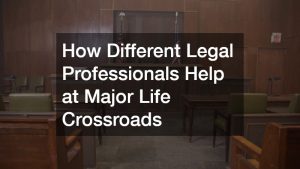Attorney malpractice occurs when a lawyer fails to meet the professional standards expected in their practice, causing harm to a client. This can involve errors in legal advice, missed deadlines, or conflicts of interest. A commercial lawyer can help businesses and individuals understand their rights and pursue claims when professional misconduct occurs.
Clients trust attorneys to provide competent legal representation, and when mistakes happen, the consequences can be severe. Also knowns as legal negligence, attorney malpractice often leads to financial losses, failed cases, or unresolved commercial disputes. Understanding how to identify and address legal negligence is crucial for protecting one’s legal interests.
Common Examples of Attorney Malpractice
Legal negligence can manifest in different ways, including:
- Missed Deadlines: Failing to file documents on time can lead to case dismissal or loss of legal rights.
- Inadequate Legal Advice: Providing incorrect or incomplete legal counsel can negatively impact a client’s case.
- Breach of Confidentiality: Sharing sensitive client information without consent violates professional duties.
- Conflict of Interest: Representing multiple clients with opposing interests can compromise legal representation.
- Failure to Follow Client Instructions: Ignoring a client’s requests or making decisions without consent can be grounds for a claim.
The Role of a Commercial Lawyer in Legal Negligence Cases
A commercial lawyer plays a key role in handling claims of legal negligence, especially in commercial disputes. They assess the impact of a lawyer’s errors, gather evidence, and determine if a case for negligence can be pursued. Their expertise is essential in holding negligent attorneys accountable while ensuring the affected party receives proper compensation.
Legal professionals specializing in commercial litigation also help businesses mitigate risks associated with legal negligence. By conducting due diligence and ensuring compliance with legal obligations, companies can protect themselves from costly legal mistakes. Seeking legal advice early can prevent disputes from escalating into serious financial or reputational damages.
How Legal Negligence Affects Commercial Disputes
When legal negligence occurs in commercial disputes, the consequences can be significant. Businesses may lose valuable contracts, face regulatory penalties, or suffer from prolonged litigation. If an attorney’s mistake leads to an unfavorable outcome, the affected party may have grounds for a legal negligence claim.
Common ways legal negligence impacts commercial litigation include:
- Loss of critical evidence due to missed deadlines or poor case management.
- Inadequate legal arguments that weaken a company’s position in court.
- Breaches of professional duty that result in financial penalties or contractual breaches.
- Misinterpretation of laws that expose businesses to legal liability.
Proving Legal Negligence
To establish a claim for legal negligence, the following elements must typically be proven:
- Duty of Care: The attorney had a professional obligation to provide competent legal representation.
- Breach of Duty: The lawyer failed to meet the required standard of care.
- Causation: The breach directly caused harm or financial loss.
- Damages: The client suffered measurable damages as a result of the attorney’s actions.
Gathering documentation, including emails, contracts, and court filings, can help support a legal negligence claim. A commercial lawyer can analyze the case and determine the best course of action for seeking compensation.
Preventing Legal Negligence in Business Transactions
Businesses can take proactive steps to minimize the risks of legal negligence. Some best practices include:
- Thoroughly Vetting Legal Counsel: Research an attorney’s qualifications, experience, and track record before hiring.
- Clear Communication: Ensure that legal instructions are provided in writing and that attorneys acknowledge receipt.
- Regular Case Reviews: Monitor ongoing legal matters and request updates from legal counsel.
- Understanding Legal Rights: Stay informed about key legal obligations and seek second opinions when necessary.
Remedies for Legal Negligence
If a client suffers due to legal negligence, several remedies may be available, including:
- Filing a Lawsuit: Clients can sue negligent attorneys for damages resulting from their errors.
- Professional Disciplinary Actions: Filing a complaint with a bar association may result in penalties or even disbarment for the attorney.
- Negotiating Settlements: In some cases, disputes can be resolved through legal processes such as mediation or settlements to avoid prolonged litigation.
Handle Attorney Malpractice Armed with the Right Knowledge
Attorney malpractice can have serious consequences for businesses and individuals relying on competent legal representation. Understanding the warning signs and knowing how to respond can help mitigate risks and seek appropriate remedies. An expert specializing in this field like Judge Arthur J. Gajarsa can provide valuable guidance in navigating these complex legal disputes.
By taking proactive steps, businesses can protect their interests and minimize the chances of falling victim to legal negligence.







